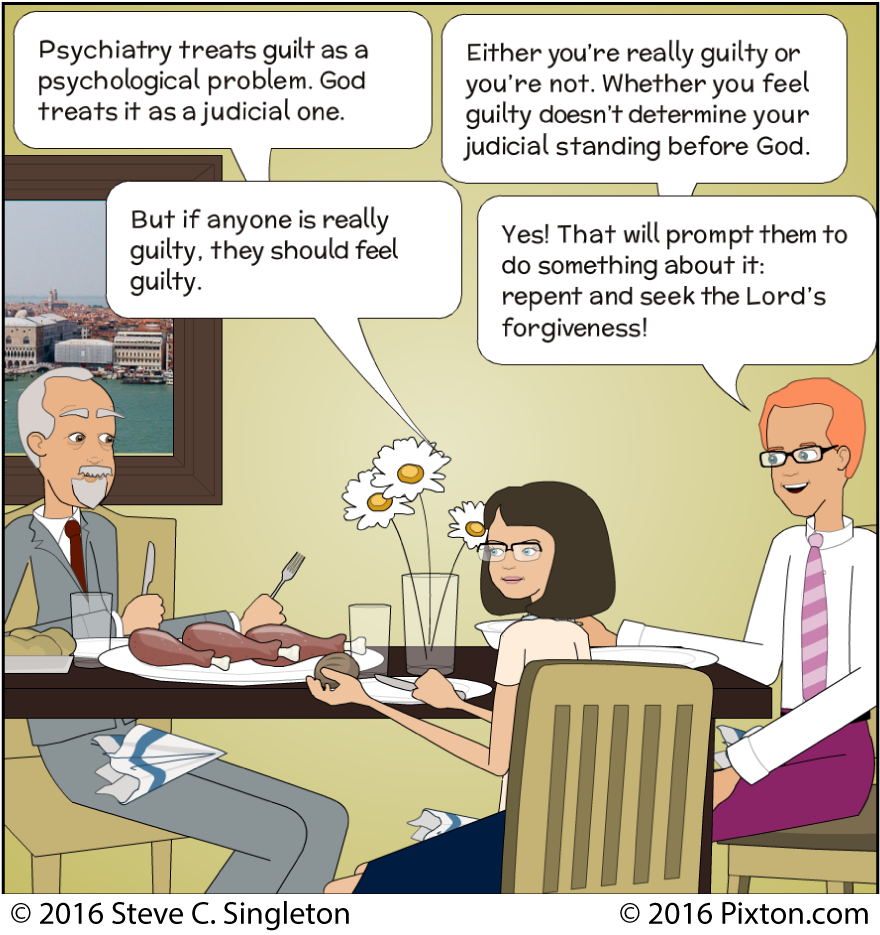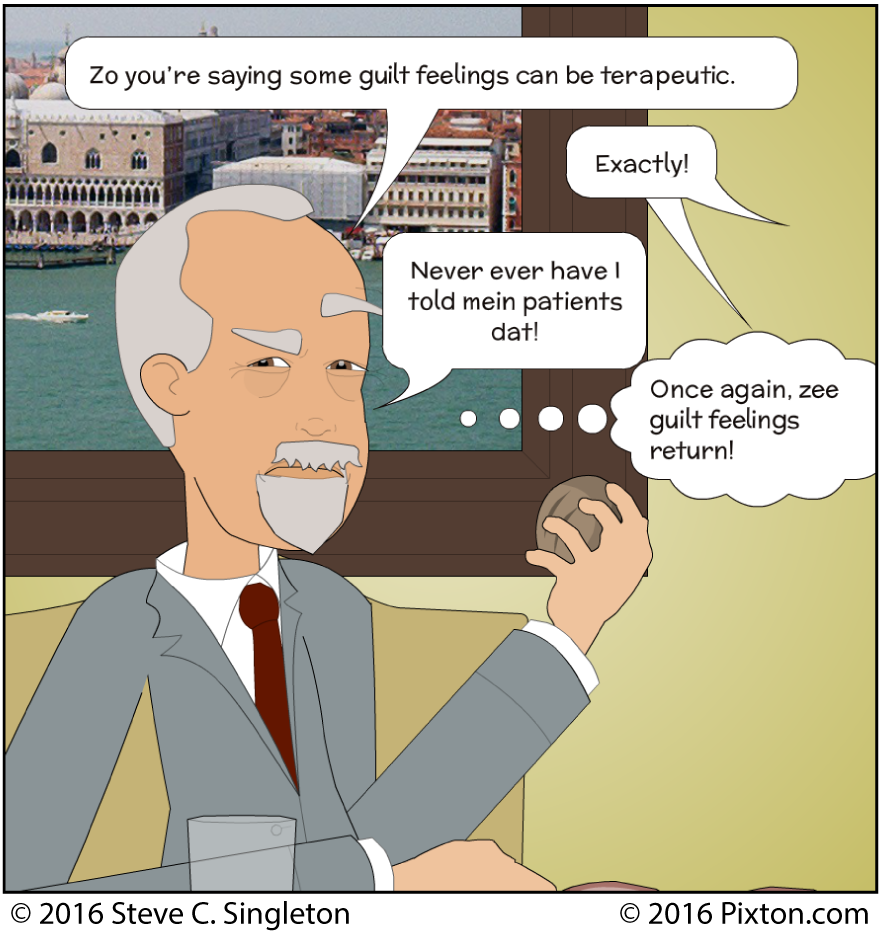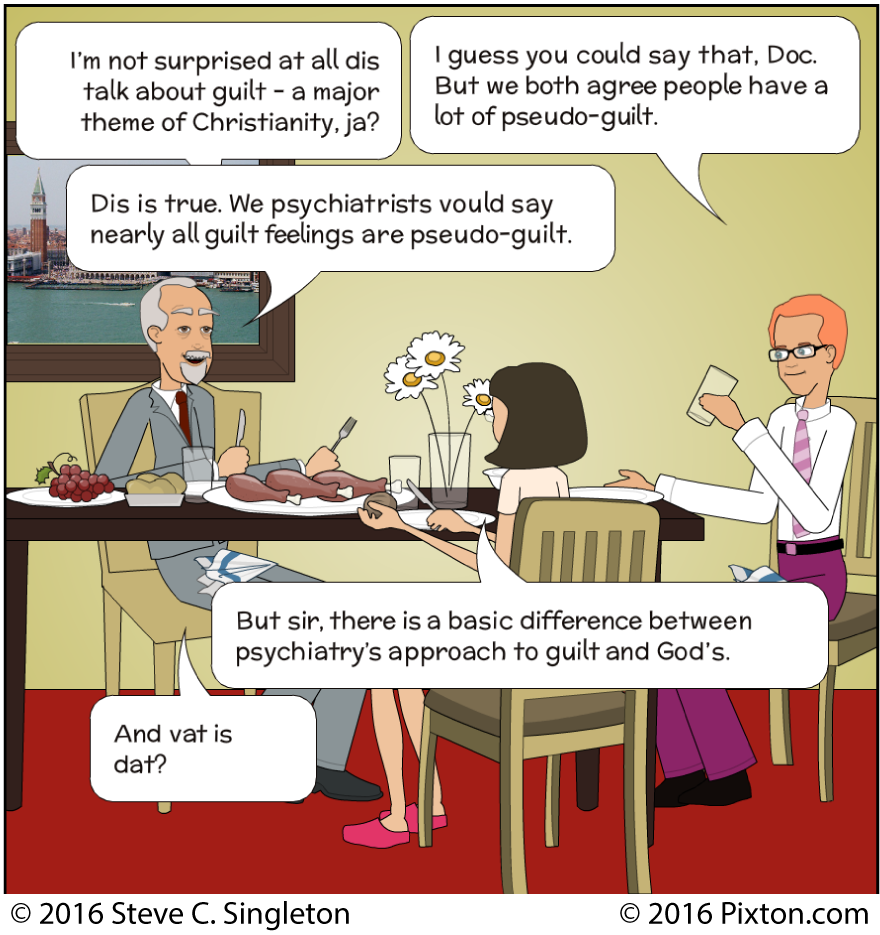Do we have true guilt, or just guilt feelings?

 Where do guilt feelings come from?
Where do guilt feelings come from?
Nearly everyone at one time or another feels guilty. If we confess these feelings to friends, they might try to convince us that we shouldn’t have these feelings, perhaps prompting within us guilt feelings over feeling guilty – what we could call metaguilt. These feelings build up over time, layer after layer, eventually becoming in some of us a huge burden that weighs us down day after day.
The approach of much of psychology is to convince us that much or all of the guilt we carry is an illusion. Those who would deny the validity of any moral absolutes logically go on to deny moral accountability. A human-based moral code necessarily implies that its warning systems are relative.
Where does real guilt come from?
In contrast to this, the Bible reveals that guilt – true guilt – occurs when we violate the moral absolutes that are defined by the nature of God himself, as God says when making his covenant with Israel: “Be holy, because I, the Lord your God, am only ” (Leviticus 19:2). This verse reveals the fundamental basis for all of human morality. This is why, again and again, God’s commands in the law are followed by some such phrase as, “I am the Lord” (see, e.g., Leviticus 19:3, 4, 10, 12, 14, 18, etc.).
Human beings, in their weakness, find themselves constantly falling short of this absolute standard of moral perfection. When we do, we often feel guilty about our failure. We have fallen short of God’s expectations for us. We have been disloyal to the one who has always tried to bless us. Our guilt feelings alert us to the reality of our rebellion.
Judicial versus psychological guilt
We commit a serious error when we try to dismiss all of our guilt feelings as if they were the vestige of a bygone age. When the Bible speaks of guilt, it is referring to guilt in a judicial sentence. The crime has occurred deserving of a just punishment. And what is that punishment? The apostle Paul declares, “The wages of sin is death” (Romans 6:23), a verdict which agrees with the much earlier declaration of the prophet Ezekiel: “the one who sins is the one who will die” (Ezekiel 18:20).
We must face the unfortunate reality that at least some of our guilt feelings come from the true guilt we have incurred as sinners.
How to handle guilt feelings
This is not to deny that we may also have guilt feelings that are totally unconnected with anything that we have done wrong. Modern psychology is correct when it attempts to relieve us of this burden. The challenge, however, is to distinguish between the two: guilt feelings resulting from mistakes, failures, and rebellions that we have truly committed, and those guilt feelings that others engender in us or that we wrongly but willingly take on ourselves.
The more we can distinguish between the two, the better we can handle all of our guilt feelings, no matter what each cause truly is. Spiritual wisdom, gained by a study of God’s word, by an earnest application of its principles, and by listening to the counsel of godly advisors, enables us to discern true and false guilt feelings.
How to handle real guilt
When we realize that we truly are guilty, our guilt feelings serve to motivate us to take action so that we can find forgiveness. The Bible has a word for this action; it is called repentance. Repentance means a change of heart that results in a change in the direction of our actions. For example, Paul tells the Ephesian Christians, “Each of you must put off falsehood and speak truthfully to his neighbor…. He who has been stealing must steal no longer, but must work, doing something useful with his own hands, that he may have something to share with those in need” (Ephesians 5:25, 28).
What if our guilt feelings are pseudo-guilt?
If in our self-examination we realize that our guilt feelings have no basis in our conduct, we should immediately dismiss them, reassuring ourselves that we are innocent. When we find it difficult to reassure ourselves, we should seek such reassurance from our brothers and sisters.
The apostle John says, “Dear children, let us not love with words or tongue but with actions and in truth. This then is how we know that we belong to the truth, and how we set our hearts and rest is present whenever our hearts condemn us. For God is greater than our hearts, and he knows everything” (1 John 3:18-20). In other words, when we feel condemned, our spiritual siblings, whose love goes far beyond mere words, can help us find the confidence to stand before God.
What if we are guilty but don’t feel it?
As destructive as it is, such pseudo-guilt is not as dangerous as becoming callous to our sins and feeling nothing at all. The apostle Paul reports that some of his opponents had consciences seared as with a hot iron (1 Timothy 4:2). When they sin, they feel no regret. Nothing within is there to prompt them to turn back to God. Perhaps without even being aware, they have drifted away from him (see Hebrews 2:1). The writer of Hebrews warns, “It is a dreadful thing to fall into the hands of the living God” (Hebrews 10:31).
Repentance and forgiveness: The ultimate solution for guilt
Once our perception of our true guilt prompts us to repent, we must seek the forgiveness that God has provided for us. That forgiveness to us as a result of the selfless sacrifice of Jesus Christ on the cross.
Having lived a sinless life (Hebrews 4:15; 1 Peter 1:19; 1 Peter 2:22; John 8:46), he is the only one qualified to be our substitute. Paul asked explains God’s provision: “In Christ, God was reconciling the world to himself, not counting men’s sins against them…. We implore you on Christ’s behalf: be reconciled to God. God made him who had no sin to be a sin offering for us, so that in him we might become the righteousness of God” (2 Corinthians 4:19-21).
In order for us to receive the forgiveness available from Jesus Christ our Savior because of his death, God calls on us to submit to him as our Lord. In other words, he not only wants to forgive us but also to direct our steps from now on. Such submission to him must be a public thing, for he recruits us in his mission to save others. We confess Christ as our Savior and master (Romans 10:10, 13; Matthew 10:32-33).
We’ve been enjoying him in a reenactment of the saving event, as God through baptism unites us to his death, his burial, and his resurrection, thereby cutting off our sins, burying them along with the old person, and raising us up to a new life empowered by the Holy Spirit (Colossians 2:11-15; Romans 6:4-7; 1 Corinthians 12:13).
In this new life, Christ inspires us to follow in his footsteps, walking in the light (1 John 1:7; 1 John 2:6). We still stumble and sometimes fall, “but if we confess our sins, “he is faithful and just and will forgive our services and purify us from all unrighteousness” (1 John 1:9). James urges us to confess our sins to one another and pray for one another, that we might be healed” (James 5:16). In the same verse, he reassures us that quote the prayer of a righteous person is powerful and effective.”
Want to go deeper?
Here are some passages to consider about guilt and guilt feelings:
Psalm 32:1-5 – David remembers the anguish of his guilty feelings resulting from his sins. Then he seeks and receives true forgiveness.
Proverbs 30:12 and Proverbs 30:18-20 – Some people have developed the ability to sin without feeling guilty. These include some men who seduce women and some women who commit adultery.
Recommended for further study:
Virgil Warren – What the Bible Says About Salvation. Joplin, Mo.: College Press, 1982. 622 pages.
Fayne Bass and Steve Singleton. Because of the Cross. DeeperStudy, 2001. This 47-page self-directed Bible study is yours to download free of charge.



